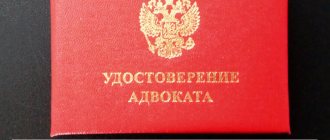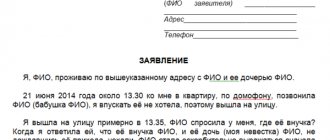In accordance with the Constitution of the Russian Federation - the law on the basis of which all other legal acts in Russia are created, any citizen has unshakable rights and freedoms - the right to life, health, housing, freedom of religion, education, work, etc. Failure to comply with these rights is unacceptable, except for restrictions established by the court (for example, when permission is given to wiretap or search).
In cases of discrimination, that is, violation of the constitutional rights of a citizen, illegal actions, including those of government officials, can be appealed to the court. In addition, the perpetrators may face criminal or administrative liability. For what articles and in what cases – read in this publication.
Resolution of the Plenum of the Supreme Court of the Russian Federation dated December 25, 2018
This is not the first time that the Supreme Court has taken up the task of summarizing the problems of protecting the constitutional rights of Russians. In December 2021, Resolution No. 46 of the Plenum of the Supreme Court of the Russian Federation was finally adopted, which draws the attention of Russian courts to the protection of the guaranteed freedoms of everyone in:
- inviolability of private life, personal and family secrets, as well as the confidentiality of correspondence, telephone conversations, postal and other messages (Article 23 of the Constitution of the Russian Federation);
- inviolability of housing (Article 25 of the Constitution of the Russian Federation);
- remuneration for performing labor duties in an amount not lower than the minimum wage (Article 37 of the Constitution of the Russian Federation);
- support from government agencies for those in social need, that is, children, disabled people, the elderly, etc. (Articles 7 and 38 of the Constitution of the Russian Federation);
- other fundamental rights and freedoms of a citizen (guarantee of authorship rights, freedom of religion, freedom to participate in government elections, etc.).
Violation of each of the listed human rights entails criminal liability in accordance with the articles contained in Chapter 19 of the Criminal Code of the Russian Federation (Articles 136 - 149 of the Criminal Code of the Russian Federation). The investigation of such crimes is carried out by the Investigative Committee of the Russian Federation.
Let's look at each of them in more detail.
What are the restrictions?
In addition to the fact that the Constitution deals with the infringement of human rights, there are certain restrictions, which make it possible to determine the level of freedom of a citizen in the state in which he resides. With the help of such restrictions, certain boundaries are established. Which, for example, allow people with disabilities to freely enjoy their rights and freedom. Rights can be limited only if there are some grounds for this. For example, such measures may be used to protect the Constitution, health or moral character, to ensure the defense of the state. But despite this, some rights still cannot be limited, such as:
- The right to live.
- Inviolability of personal life position.
- An attack on dignity.
- Guarantees that directly relate to privacy information.
- Freedom of the right to have your own property and engage in entrepreneurial activity.
As a rule, restrictions are needed to ensure the activities of law enforcement agencies.
Article 136 of the Criminal Code of the Russian Federation - violation of equality of human rights and freedoms
The inadmissibility of discrimination against a person on the basis of gender, race, or nationality is enshrined at the international level - for example, such provisions are in the Convention for the Protection of Human Rights and Fundamental Freedoms (concluded in Rome in 1950), which Russia is obliged to observe by virtue of ratification. In Russian criminal law, the prohibition of discrimination is provided for in Art. 136 of the Criminal Code of the Russian Federation.
Liability under this provision of the Criminal Code may arise in cases where the guarantees proclaimed by the Constitution of the Russian Federation for equality of human rights and freedoms are violated, regardless of:
- gender (men and women are equal in their rights);
- race (infringement of opportunities due to race is unacceptable);
- nationality;
- language;
- origin;
- property or official status;
- living place;
- religious preferences;
- other beliefs (including political);
- belonging to public associations and organizations.
Examples of crimes under Art. 136 of the Criminal Code of the Russian Federation may be: refusal to hire on racial grounds, obstacle to enrollment in a university due to nationality, adherence to certain political views or membership of a certain party, etc. There can be many types of crimes, taking into account the many constitutional rights.
If the fact of refusal to hire for other reasons is established - for example, out of personal hostility, then there will be no corpus delicti under the article in question of the Criminal Code.
A defendant in a criminal case under Art. 136 of the Criminal Code of the Russian Federation can only be an official .
He is a person in power who has the authority to make decisions on issues related to the observance of constitutional rights. For example, such a person could be the director of an LLC, who assigns additional allowances and bonuses exclusively to those employees who adhere to a certain religion. In this regard, other employees are subject to discrimination on religious grounds. If the accused of such a crime holds a position in government bodies, then his actions are additionally qualified for crimes provided for in Art. 285, 286 of the Criminal Code of the Russian Federation – abuse or excess of official powers.
It should be noted that the number of criminal cases under Art. 136 of the Criminal Code of the Russian Federation, considered by the courts, is calculated in units. This is partly explained by the fact that officials are well aware of the inadmissibility of violating the rights provided for by the supreme law (the Constitution of the Russian Federation).
At the same time, experts note latent crime in this area: there are cases when the employer’s refusal is veiled by the “official version” - for example, insufficient competence and knowledge in a certain field of activity. If the victim, whose rights have been violated, contacts law enforcement agencies with a statement to initiate a criminal case under Art. 136 of the Criminal Code of the Russian Federation, it will be difficult to prove the crime, since in the documents the reason for refusal to hire or dismissal will probably be indicated correctly. This is the difficulty of investigating such cases.
Punishment under Art. 136 of the Criminal Code of the Russian Federation can be in the form of:
- a fine in the amount of 100,000 to 300,000 rubles;
- deprivation of engaging in certain activities or holding certain positions for a period of up to 5 years;
- compulsory work for up to 480 hours;
- correctional labor for up to 2 years;
- imprisonment for up to 5 years.
It is necessary to distinguish the elements of the crime provided for in Art. 136 of the Criminal Code of the Russian Federation, from administrative liability for violation of the constitutional rights and freedoms of a citizen of the Russian Federation under Art. 5.62 Code of Administrative Offenses of the Russian Federation. In accordance with this provision of the administrative law, a legal entity (fine up to 100,000 rubles) or an individual (fine up to 3,000 rubles) is liable for violation of the same guarantees listed above, whereas according to Article 136 of the Criminal Code of the Russian Federation - only an official.
Violation of social rights. The essence
Violation and infringement of human rights can also relate to socio-economic discrimination. As a rule, such an offense is directly related to a property issue and to resolve the problem, it is often necessary to resort to court. Social rights include:
- Every person living in the territory of the Russian Federation has the right to acquire his own property.
- A person can freely engage in the work activity that suits him.
- Complete freedom of economic activity is ensured.
The Constitution strictly prohibits forced labor. Everyone can choose the most suitable profession and occupation for themselves.
Article 139 of the Criminal Code of the Russian Federation - violation of the inviolability of the home
In accordance with Art.
25 of the Constitution of the Russian Federation, a person’s home is inviolable for strangers. This means that no one has the right to enter a house or apartment against the will of the owner or members of his family. These rules ensure the constitutional housing rights of every Russian. For violation of such rights, an intruder who entered a person’s house without his permission will be prosecuted under Art. 139 of the Criminal Code of the Russian Federation.
In the note to this article, the legislator provided for the concept of housing. This includes not only an apartment, a private house, but also a dorm room, a garden, forest or prefabricated house, as well as other buildings adapted for temporary or permanent residence (for example, an equipped trailer).
Dwelling as such does not include outbuildings (sheds, garages), as well as cabins on ships, compartments on trains, etc.
It is believed that only a legal right can be violated. This means that victims under Art. 139 of the Criminal Code of the Russian Federation can be recognized as a person who lives in a dwelling legally - in accordance with a purchase and sale agreement, lease, as a result of privatization or with the permission of a loved one.
Law enforcement officers are allowed to violate the inviolability of housing in a number of cases (this will not be considered a violation of constitutional law):
- there is a court decision on the legality of the search;
- in accordance with Art. 15 of the Federal Law “On the Police of the Russian Federation” there is a need to save lives or protect property rights, to detain a criminal, to ensure security during mass riots, as well as to prevent a crime or accident.
For committing a crime under Art. 139 of the Criminal Code of the Russian Federation provides for punishment in the form of:
- fine up to 80,000 rubles;
- compulsory work for up to 360 hours;
- corrective labor for up to 1 year.
If an attacker enters someone else's home using violence against a resident or threatens him with such violence, he may be sentenced to imprisonment for up to 2 years . If official position is used, the punishment can reach three years in prison.
It should be noted that in some cases, illegal entry into a home is not qualified separately under Art. 139 of the Criminal Code of the Russian Federation, since it is completely covered by another article. For example, if a thief entered an apartment for the purpose of theft and committed the theft of property located in a residential premises, his actions will be qualified under paragraph “a” of Part 3 of Art. 158 of the Criminal Code of the Russian Federation as theft committed with illegal entry into a home (punishment can reach 6 years in prison).
Article 140 of the Criminal Code of the Russian Federation – refusal to provide information to a citizen
This crime is based on non-compliance with Part 2 of Article 24 of the Constitution of the Russian Federation, according to which every citizen is guaranteed the opportunity to familiarize himself with documents affecting his interests .
Government officials are obliged to provide the Russian with the information he has requested and do not have the right to refuse him this, otherwise they are liable under Art. 140 of the Criminal Code of the Russian Federation.
It is criminally punishable:
- complete refusal to provide the citizen with the necessary information;
- partial refusal (some documents are submitted, the rest are not);
- evasion by an official of the obligation to provide data (for example, formal replies if there is an objective opportunity);
- provision of information that does not correspond to reality (in this case, the official knew in advance about the falsity of the information).
An example of a violation of a person’s right to receive meaningful information could be an unjustified refusal to provide information about the death of parents at the request of a son or daughter, evasion of providing a mother with documents for review in a criminal case against a minor accused, etc.
The punishment provided for in Art. 140 of the Criminal Code of the Russian Federation , may be in the form of a fine of up to 200,000 rubles or in the form of a ban on holding certain positions for up to 5 years.
Civil law. Provisions
The article “infringement of human rights” mainly protects the civil position. What does it mean? The fact that it is this category of rights that protects the person as an individual:
- First of all, everyone has the right to life.
- No one can infringe on the honor and dignity of an individual.
- Every citizen and person simply staying on the territory of the Russian Federation can move freely throughout the country.
- Any person has the right to independently choose a place to live.
- No one has the right to cruelly treat another person, and if this happens, the guilty party must be punished.
- Everyone has the right to think freely, choose their religion and act according to their conscience.
- The citizen is provided with protection of his life and his family.
In fact, there are a large number of such rights, but only the main ones are listed above.
Violations of citizens' labor rights
The Criminal Law of the Russian Federation provides for 5 articles under which liability arises for violation of constitutional labor rights. Let's take a closer look at them.
1. Article 143 of the Criminal Code of the Russian Federation – violation of labor protection requirements.
Under this article, a guilty person who violates the constitutional right of a citizen, provided for in Part 3 of Art. 37 of the Constitution of the Russian Federation – “the right to work in conditions that meet safety and hygiene requirements”, if due to a violation:
- the employee received serious bodily injuries (loss of organ function, disability, loss of professional fitness, etc. - specific consequences and their classification as serious are determined by a forensic expert);
- the death of an employee has occurred;
- the death of two or more workers occurred.
Indirectly, when committing this crime, the requirements of Art. 210 of the Labor Code of the Russian Federation, which proclaims the priority of preserving the life and health of the employee, based on compliance with environmental, sanitary standards and rules.
Often the crime provided for by 143 of the Criminal Code of the Russian Federation, is committed by inaction. For example, when the official responsible for developing regulations on labor protection did not do this on time. If the consequence of such inaction is the death of an employee at the workplace, the guilty official will be held liable under Part 2 of Art. 143 of the Criminal Code of the Russian Federation, punishment under which can reach imprisonment for up to 4 years (if the death of two employees occurs - up to 5 years in imprisonment).
2. Article 144 of the Criminal Code of the Russian Federation - obstruction of the activities of journalists.
Article 29 of the Constitution of the Russian Federation proclaims freedom of thought and speech, including in the media. When this provision is violated, the victim often becomes a professional journalist who is prevented from publishing revealing materials or who, on the contrary, is forced to publish materials that the attackers need.
An obstacle can be expressed in different ways:
- threat of termination of the activities of a publishing house, channel, etc.;
- threat of suspension of a journalist’s activities, denial of accreditation;
- violence or threat of violence against the journalist himself or his relatives;
- damage or destruction of property of a journalist or his relatives;
- threat of dismissal and dissemination of unpleasant information about the journalist, etc.
Guilty of committing a crime under Art. 144 of the Criminal Code of the Russian Federation, punishment may be imposed in the form of:
- a fine of up to 80,000 rubles, compulsory labor for up to 360 hours, corrective labor for up to 1 year (for obstruction without additional signs);
- a fine of up to 300,000 rubles, compulsory labor for up to 480 hours, correctional labor for up to 2 years, imprisonment for up to 2 years (if the crime was committed using an official position);
- imprisonment for a term of up to 6 years (if the crime was committed with violence, with damage or destruction of property or with the threat of committing such actions).
3. Article 144.1 of the Criminal Code of the Russian Federation - unjustified refusal to hire persons of pre-retirement age or dismissal of such workers.
This article was introduced in October 2021 in connection with the reform of the gradual increase in the retirement age in Russia. The norm prohibits an employer from discriminating against pre-retirees and violating their right to work under threat of punishment in the form of a fine of up to 200,000 rubles or compulsory work for a period of 360 hours.
Thus, the legislator secured strict observance of the guaranteed rights provided for in Part 3 of Art. 19 of the Constitution of the Russian Federation on freedom to manage one’s abilities in the labor sphere (that is, choose a profession, work in a specialty, or not work at all).
Read more about people of pre-retirement age and their rights.
4. In order to comply with the guaranteed constitutional right to freedom of disposal of one’s labor skills, as well as for the purpose of state support for motherhood and childhood, Article 145 of the Criminal Code of the Russian Federation provides for criminal liability of an employer for an unjustified refusal to hire or dismissal of pregnant women or women with a child before 3 years old .
It is no secret that this category of workers is undesirable for employers: they need to pay benefits, sick leave, etc. At the same time, the law strictly protects the rights of women with children: Article 145 of the Criminal Code of the Russian Federation provides for punishment similar to that specified in Art. 144.1 of the Criminal Code of the Russian Federation on prosecution for labor discrimination of pre-retirees.
By the way, in the Resolution of the Plenum of the Armed Forces of the Russian Federation dated December 25, 2018, the attention of the courts was drawn to the fact that in the event of termination of an employment contract at the initiative of the employee, but if there are grounds to believe that the employer forced the woman to submit an application “of her own free will,” the crime provided for in the article 145 of the Criminal Code of the Russian Federation may take place. A similar rule applies in the case of dismissal or refusal to hire a pre-retirement employee, when he was forced to stop applying for a position under duress from the employer.
5. Article 145.1 of the Criminal Code of the Russian Federation contains provisions on the criminal liability of the employer for non-payment of wages for more than two or three months in a row, that is, for violation of the constitutional right of a person to decent remuneration for his work (Part 3 of Article 37 of the Constitution of the Russian Federation).
It should be noted that currently there are much fewer cases of non-payment of wages than in the 90s and 2000s, but such facts still occur. In most cases, workers are left without wages when enterprises, factories go bankrupt, or private organizations are liquidated. Responsibility under this article also arises in cases of non-payment of pensions, scholarships, and benefits.
The Supreme Court of the Russian Federation, in its Resolution of the Plenum dated December 25, 2018, drew the attention of the courts to the need to thoroughly determine the reasons for which mandatory accruals were not paid. It is important to establish that there was an objective opportunity to provide remuneration to employees, but the employer did not do this (spent the money on other, non-priority needs) - this is precisely a sign of a significant violation of the employee’s constitutional right. Often, investigative authorities involve specialists to do a financial study of the economic state of the organization.
Article 145.1 of the Criminal Code of the Russian Federation contains three parts:
- partial (less than half of the accrued) non-payment of wages for more than three months in a row by the head of the organization where the employee works is punishable by a fine of up to 120,000 rubles, deprivation of the right to hold a certain position or imprisonment for up to 1 year;
- complete non-payment of wages for more than two months in a row or payment of wages below the minimum wage (as of January 1, 2021 - 11,280 rubles) - is punishable by a fine of up to half a million rubles, as well as imprisonment for up to 3 years;
- actions provided for by the first or second part of Art. 145.1 of the Criminal Code of the Russian Federation, if, as a result of non-payment, serious consequences have occurred (employee illness, disability, loss of property, etc.) - the maximum punishment can be imprisonment for a term of up to 5 years.
Let us note that the employer is liable under this article only if he does not pay wages intentionally, for selfish or personal reasons. For example, when the head of an enterprise saves on wages in order to write out another bonus for himself, or purchases new equipment for business development, while considering that ordinary workers can do without wages for 3-4 months.
The law allows for exemption from criminal liability for an employer who, within two months from the date of initiation of the case, has paid all debts to employees with interest. In such cases, the case may be dismissed.
How rights are violated
Despite the fact that many countries actively use the document, according to which a ban on cruel treatment of people is established, cases of violation of individual freedoms are still common. Infringement of human rights in the criminal procedural legislation of the Russian Federation indicates that confiscation of property or even a fine may be used as punishment. In Russia, facts have been recorded of the issuance of special acts that directly contain provisions that are not related to the Constitution; this indicates a direct violation.
Article 146, 147 of the Criminal Code of the Russian Federation – violation of copyright, invention, patent rights of a citizen
Failure to maintain authorship of works of science, painting, and music is also a violation of the Constitution of the Russian Federation, namely, Article 44. Victims in cases of crimes under Art. 146 and 147 of the Criminal Code of the Russian Federation are the authors, as well as copyright holders (if copyrights have been legally transferred to them).
Attribution of authorship is called plagiarism, to establish the signs of which an appropriate examination is always assigned. People who distribute the products of someone else's creativity, passing them off as their own (for example, trying to implement the lyrics of a song written by another person as their own) are subject to criminal liability.
In addition, liability may also arise in cases where the seller does not appropriate someone else’s authorship, but does not have the right to sell, while actively trading media with various technical programs, computer games, antivirus programs, etc.
A criminal offense in both the first and second cases will be actions that caused major damage to the author (more than 100,000 rubles).
Read more about criminal liability for crimes that violate the constitutional rights of authors.
Rights area
It should be noted that the areas of human rights have been developed in accordance with international standards, they include the following points:
- First of all, the area that the state must provide is taken into account. The population is provided with fundamental rights; no one has the right to carry out actions that in any way may infringe on the freedom and rights of persons with disabilities. It is important!
- The state must ensure full protection of its population and any infringement of human rights must be stopped immediately.
- Any activity that is aimed at violating the freedom of an individual must be immediately condemned and punished.
Whatever standards apply, they are universal and apply throughout the world, so every person should know their rights and actively use them if they find themselves in a difficult situation.
Article 148 of the Criminal Code of the Russian Federation – violation of the constitutional right to freedom of conscience and religion
Based on Art. 28 of the Constitution of the Russian Federation, every Russian is guaranteed freedom in matters of religion, freedom to spread religious beliefs among other people. A person may not adhere to any religion at all, this is his right.
Public calls that offend the feelings of believers are a criminal offense, the punishment for which can be imprisonment for up to 1 year.
Read more about criminal liability for insulting the feelings of believers.
Article 149 of the Criminal Code of the Russian Federation - an obstacle to holding a lawful rally or demonstration
Citizens of Russia, according to Article 31 of the Constitution of the Russian Federation, are allowed to hold authorized rallies, meetings and processions, but only for peaceful purposes. For obstructing such meetings under Art. 149 of the Criminal Code of the Russian Federation are subject to liability:
- officials who, by their decisions, make it impossible to hold a demonstration, procession, etc., provided that the participants in the rally previously received permission in the prescribed manner (for example, dispersing demonstrators, threatening subordinate employees with dismissal, etc.);
- any person who threatens or uses violence (beatings, minor bodily harm) to prevent people from participating in a rally, or, conversely, forces them to participate in it.
Punishment for a crime under Art. 149 of the Criminal Code of the Russian Federation, may be in the form of a fine of up to 300,000 rubles or in the form of imprisonment for up to 3 years.
Links to legislative acts
- Chapter 19 of the Criminal Code of the Russian Federation. Crimes against constitutional rights and freedoms of man and citizen






